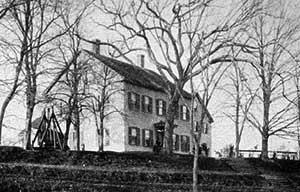Primary Sources and the Residents of Brook Farm
When writing about really anything at all from history, it is very important to see the topic directly through the eyes of the people who lived at that time and personally witnessed or experienced what it is that you are writing about. Primary sources are the writings of those people, and therefore they are most helpful in providing us with a window into the topic of our choosing. The writings of residents of Brook Farm provide me with an image of the community that I could never receive from secondary sources written by other historians. For example, the letters written by Nathaniel Hawthorne while he lived at Brook Farm describe life at the community as he experienced it, as well as his thoughts on community life. Included in his thoughts on the community, I can look for clues on what Hawthorne thought of Utopia, and what it meant to him. Based on Hawthorne’s disappointment with community life at Brook Farm, and his eventual departure, I can surmise that he did not actually consider Brook Farm to be Utopian. Since Hawthorne was a transcendentalist, and his letters describe a desire for more time to think and write, it appears that Hawthorne expected a Utopian place to be somewhere that he was more free to be creative while living equally with others.
While I don’t have a primary source written by George Ripley, the founder of Brook Farm, a secondary source that writes biographically about Ripley also serves as a window into Ripley’s experience at Brook Farm and his ideas of Utopia. According to this source, Ripley was also a transcendentalist thinker, and therefore most likely had similar views of utopia like Hawthorne. However, as he began to read works by Fourier, the French Utopian thinker that inspired the American Associationist movement, Ripley’s view of utopia most likely evolved to include many of Fourier’s ideas. This evolution of thinking can be seen in the transition of Brook Farm from a transcendentalist community to an American Associationist phalanx.
The Harbinger, an Associationist newspaper written at Brook Farm, provides insight into the ideals of the Associationists that lived at Brook Farm when it existed as a phalanx. Because this paper was written by the residents of Brook Farm during its existence, it also qualifies as a primary source. The introduction of the paper thoroughly describes the mission of the Utopian phalanx, thereby providing a clear image of how the residents of Brook Farm understood utopia.
